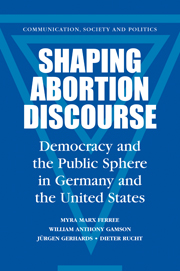Book contents
- Frontmatter
- Contents
- Tables and Figures
- Foreword by Friedhelm Neidhardt
- Preface
- Glossary
- Part I Introduction
- Part II Major Outcomes
- Part III Representing Different Constituencies
- 7 Representing Women's Claims
- 8 Representing Religious Claims
- 9 Representing the Tradition of the Left
- Part IV The Quality of Abortion Discourse
- Methodological Appendix
- References
- Index
7 - Representing Women's Claims
Published online by Cambridge University Press: 15 December 2009
- Frontmatter
- Contents
- Tables and Figures
- Foreword by Friedhelm Neidhardt
- Preface
- Glossary
- Part I Introduction
- Part II Major Outcomes
- Part III Representing Different Constituencies
- 7 Representing Women's Claims
- 8 Representing Religious Claims
- 9 Representing the Tradition of the Left
- Part IV The Quality of Abortion Discourse
- Methodological Appendix
- References
- Index
Summary
Since women are the only people who can experience the existential crisis of an unwanted pregnancy, it may seem self-evident that women have a special claim on the issue of abortion. Such claims, however, do not appear spontaneously and are not foreordained. Whether, when, and how gender claims are mobilized and made politically relevant is a matter of the discursive opportunities available, as well as the strategies and activities of specific actors in utilizing them. It may seem “natural” for women to have a distinctive position on abortion politics, but such positions grow from historically contingent mobilization processes that select gender as a relevant dimension for aggregating diverse interests and values (Solinger 1998).
Gender as a concept does not just mean women, or the social differences between women and men, but rather “gender is a constituitive element of social relationships based on perceived differences between the sexes and gender is a primary way of signifying relationships of power” (Scott 1986, p. 1067). To define men and women as categories of people with different understandings and interests means to minimize both the similarities between genders and the considerable variances within each. The meaning of gender is shaped by culture, time period, social location, and the nature of the issue.
Even when gender is, in fact, shaping experiences in major ways, it may not be recognized as a meaningful category and its significance may be socially ignored (as in the United States in the 1950s).
- Type
- Chapter
- Information
- Shaping Abortion DiscourseDemocracy and the Public Sphere in Germany and the United States, pp. 131 - 153Publisher: Cambridge University PressPrint publication year: 2002



